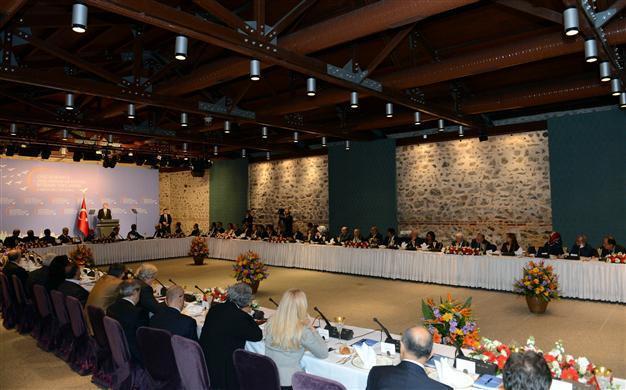Wise Persons' panel to help shape resolution process: PM Erdoğan
ISTANBUL

Turkish Prime Minister Recep Erdoğan hosted the first meeting of the 63 figures chosen by the government for the 'Wise Persons' commission, in Istanbul on April 4. AA Photo
The work of the “Wise Persons” commissions will determine the path and method that the government follows during the resolution process, Prime Minister Recep Tayyip Erdoğan said during the first meeting of the 63 prominent names in Istanbul on April 4.
“We have some thoughts about the path that we will embark upon. However the consultations that this delegation will hold are also going to be decisive for the path and the method that we will follow,” Erdoğan said, describing the Wise Persons as a “snapshot of the 76 million."
“The delegation gathered here represents very different opinions, ethnicities and beliefs. But they all have a common point: They all want to resolve a rotten problem. This is our approach as well,” he added.
The seven groups of Wise Persons will each represent one of the seven geographical regions in Turkey. Several Turkish celebrities, including actors Kadir İnanır, Lale Mansur, Yılmaz Erdoğan, Hülya Koçyiğit and musician Orhan Gencebay, have been named in the commission.
Turkish Union of Chambers and Commodities Exchanges (TOBB) Chairman Rifat Hisarcıklıoğlu, Doğan TV Holding Chairwoman Arzuhan Doğan Yalçındağ, and prominent academic and columnist Murat Belge are some of the other figures on the list.
Erdoğan praised the participants for their eagerness to contribute the talks that have been launched between the government and the jailed leader of the outlawed Kurdistan Workers’ Party (PKK).
“The people here are not only wise, they are also brave, idealistic, patriotic and pacifistic. The fact that so many people from different backgrounds stand in the same picture has revived hopes for a solution,” he said, emphasizing the psychological mission that the commission is intended to play for obtaining the public support. “What politicians can do is limited. Everyone should take their responsibility for dissipating terrorism on the psychological dimension.”
Erdoğan also added that he was open to any contribution from outside the 63 members of the commission.
Opposition to solution ‘not human’ Meanwhile, the prime minister criticized the opposition for not openly supporting the ongoing peace process. “The proposal of those who oppose a solution is the continuation of deaths. This mindset is neither human nor ethical,” he said, adding that the ruling Justice and Development Party (AKP) had “always been alone on the path.”
Erdoğan also argued that policies such as the abuses against Kurds in the notorious Diyarbakır prison after 1980 created conditions in which the PKK was able to thrive, saying that those responsible for such abuse were “as guilty as those who adopted terrorism.”
The prime minister said last week during a televised interview that the commission was expected to finish its work within a month.
Our task is to 'ferment’ peace: Commission member Following a meeting that lasted around four and a half hours, prominent academic Doğu Ergil, a member of the Central Anatolia group within the "Wise Persons Commission," described their task as being to “ferment peace.”
“[The decision about] the conditions of peace are at the government’s discretion. What they expect from us is to understand whether there is resistance in society [for the process] and, accordingly, to try to persuade such resistance to the path of peace,” Ergil said, adding that the commission did not have any specific program. "This is entirely a civil society movement."
It was decided during the meeting that Erdoğan will regularly meet with the heads of the seven groups, and the prime minister also agreed to extend the work of the commission to two months, from the one month that was initially declared.
Turkish Economic and Social Studies Foundation (TESEV) Board Chairman Can Paker, who will act as the head of the Eastern Anatolia Region group, said they would “immediately” start traveling to the regions. “We will gather and elaborate a road map,” he said.
İzzettin Doğan, the chairman of the Cem Foundation, a large Alevi association, said the groups would have their own initiative to decide on their activities in the region.
Meanwhile, ageless actress Hülya Koçyiğit said she was not part of the process as an an artist, but rather "as a mother." "I only want the tears of mothers to cease," she said.
